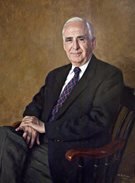
Dr. John Emmett Hall, Chief of Orthopaedic Surgery Emeritus at Boston Children’s Hospital and Professor Emeritus at Harvard Medical School, died peacefully in his sleep on March 22, 2018, at the age of 92, leaving behind grateful patients, families, and disciples.
John was raised in Saskatchewan and finished high school at age 15. During World War II, he enlisted in the Royal Canadian Air Force and served as a bomber pilot, with missions over the English Channel and Asia. He returned to Saskatoon to complete university and then went to McGill Medical School, where he met a nurse, Frankie—his future wife.
After postgraduate training in Toronto, he lived 2 years in England and worked at the Royal National Orthopaedic Hospital. There, he met Robert Salter, who became a close lifelong friend. Dr. Hall’s major published clinical research project in England was a long-term follow-up study of slipped capital femoral epiphysis, which showed his insistence on honest reporting of mediocre outcomes.
In 1957 Dr. Salter invited John to return to Toronto to The Hospital for Sick Children, with duties that included working at the spine service and treating cerebral palsy and spina bifida. Because of Dr. Hall’s negative experience with nonunion and infection while treating spinal deformity in England, he remarked to Frankie on the ship returning to Canada that he was not sure what he would do within orthopaedic surgery, but he was certain that it would NOT be treating spinal deformity!
During his time in Toronto from 1957 to 1971, Hall became the Chief of Orthopaedic Surgery. He had broad responsibilities, caring for many children with developmental dysplasia of the hip, proximal femoral focal deficiency, and complex fractures. He believed that the pediatric orthopaedic surgeon should be concerned with the whole welfare of the child; his training in general surgery and thoracic surgery led him to this principle. He taught us that surgical techniques will change, but only principles survive. Visits to Paul Harrington in Houston and John Moe in Minnesota led to the mastery of posterior instrumentation and fusion for scoliosis. He also brought anterior correction of scoliosis into general use by hosting Allen Dwyer, then a little-known Australian surgeon with a new anterior spinal instrumentation system. A great mentor, trainees who were inspired by Dr. Hall included Jean Dubousset, Erwin Morscher, John Kostuik, and Kiyoshi Kaneda.
In 1966, Dr. Hall was 1 of the 37 founding members of the Scoliosis Research Society (SRS) and the second president of the society. In 2008, he received the SRS Lifetime Achievement Award. He also played a key role in the development of the Pediatric Orthopaedic Society of North America (POSNA) by joining the invitation-only Pediatric Orthopaedic Society (POS) in 1971 and becoming its president in 1980. The merger of the POS with the Pediatric Orthopaedic Study Group led to the formation of POSNA in 1983.
In 1971 he became the Chief of Orthopaedics at Boston Children’s Hospital, where he grew a department with a great tradition for nonoperative orthopaedics into a dynamic center. Early on, he picked his staff, such as Hugh Watts, Lyle Micheli, and many others, for their general clinical excellence, although he encouraged their specialty interests and expertise. He believed it was tremendously important to choose one’s associates well: hire good people and then get out of the way. Dr. Hall and M.E. “Bill” Miller developed the Boston Spinal Bracing System, which is still used globally. Never satisfied with the status quo and always open to innovation, he encouraged Jean Dubousset, Robert Campbell, Richard McCarthy, and others to develop novel and practical instrumentation systems. In 1994, after 36 years of clinical practice, Dr. Hall stepped down as Chief at Boston Children’s Hospital, and 80 of his chief residents and fellows held a Festschrift in his honor.
Yet he continued serving as a valued teacher, mentor, advisor, and friend. His advice on work-life balance was “when at work, really be at work; when at home, really be at home.” He diversified with many interests outside of orthopaedics, including a love of classic cars and wine from Bordeaux. After a loving marriage and family life of 65 years, Frankie predeceased him by only 6 weeks, leaving 7 children, 7 grandchildren, and 2 great-grandchildren.
The legacy of his full life is summed up by the plaque placed by the nurses in his operating room at the Children’s Hospital: “The Dr. John E. Hall Room: Dedicated to Compassion, Respect, and Excellence”